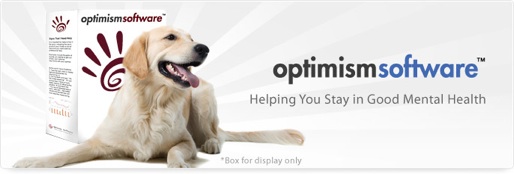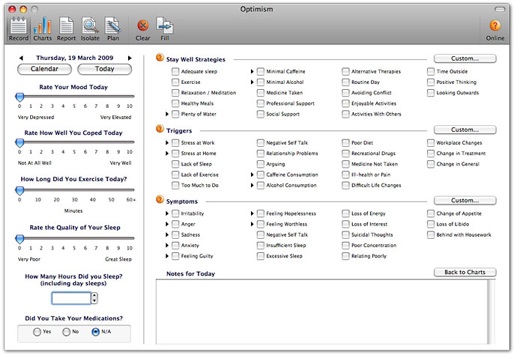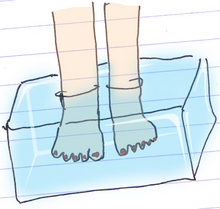
Ever since I was discharged from the inpatient psychiatric program at Johns Hopkins, I have kept a mood journal where I daily record the amount of hours I sleep, my mood (rating it a fantastic and serene no. 1 to a frazzled, and I’m-headed-back-to-the-community-room no. 5), any foods that have triggered hyperactivity or irritability (such as a triple espresso and half of a chocolate-mousse pie), my anxiety level, any medication and vitamin/supplement changes, and a list of things I’m obsessing about: weight, job, friends, sisters, yada yada yada.
My journal looks like my house: messy … dangerously messy. I scribble something down and then Katherine gets a hold of the pad and draws a mermaid, or a big X through the object of obsession. In other words: it’s not a good system. Not at all. And it can’t really do the job of picking up patterns in order predict relapses. The information is too unorganized for that.
So ….
I decided to try the Optimism Software that my blogging buddy James Bishop has designed. Keep in mind that I am a technological moron, and had to ask him about 10 times how to download it. (If I can do it, you can definitely do it.) But after it was on my desktop and I could open it and start inputting my dysfunctional habits, I decided he was a genius.
Because it is much more than a software.
It’s a way of making you a more active part of your recovery.
For example, in that last month I’ve been using the software, I have become more disciplined about my sleep hygiene. I go to bed at 9:30 every night, and I get up at 5:30 in the morning. Knowing that I have to track my sleep in Optimism makes me less apt to act on the “This is brilliant! Let’s stay up all night!” thoughts that come in right as I’m about to shut down for the night.

I’m also more aware of the contents that I put into my mouth. I wouldn’t go so far as to say that James’s software makes me eat better. (He would be very wealthy if this was the case.) But knowing that I have to record the items that tease my mood (pancakes with lots of maple syrup, double chocolate-chip cookies, mochas, fruit pops) make me more aware of the connection between the two (cookies and mood). And, I’m thinking that this awareness will eventually translate into more will power. At least that’s the plan.
The act of recording your diet, sleep, exercise, and stressors makes you more accountable. James writes:
Optimism prompts you to keep a detailed record of all things that affect your state of mind. By monitoring patterns in your life you can identify negative influences that you need to avoid, early warning signs that your health is deteriorating, and the inputs and activities that benefit you most. Simple charts highlight cause and effect relationships that you might normally miss, and you can develop a Health Plan to follow and update as you learn more about the things that positively and negatively affect you.
Go to FindingOptimism.com to find out more or to download a free trial.
To read more Beyond Blue, go to http://blog.beliefnet.com/beyondblue, and to get to Group Beyond Blue, a support group at Beliefnet Community, click here.
To subscribe to “Beyond Blue” click here.
![]()

